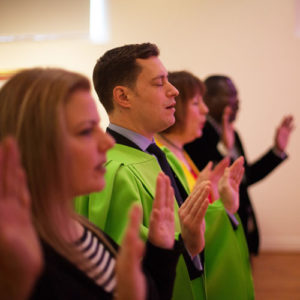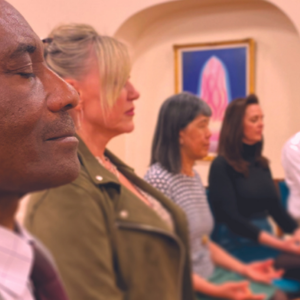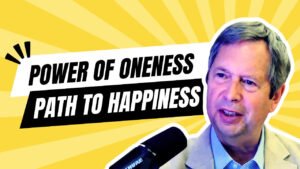Latest blog posts
17 DAYS OF SPIRITUAL WISDOM
How detached is too detached?

Stress, worry, expectations and ambitions are part of everyday life, and over time they take their toll – physically, mentally and emotionally.
They are not necessarily bad things, but that doesn’t make them any the less wearing on the heart, mind and body. However impractical or improbable it may be, haven’t you ever dreamt of just being alone in a little cottage by a lake – with no TV, no radio, no WiFi, no phone – just simple peace and quiet – to escape it all?
Detachment is something we all crave from time to time – perhaps without even realizing it. But real detachment, in a spiritual sense, isn’t about where you live, or even about how busy you are, it’s about your state of mind – and, paradoxically, it cannot work without the balance of the correct attachment.
Detachment from things that don’t matter
The first thing about detachment is pretty straightforward: not being attached to materialism. This isn’t for the sake of some religious or moral sense of virtue – it’s purely practical. Materialistic longing, over time, will invariably be detrimental to our spiritual well-being. It’s common sense – how can we ever be at peace while desperately trying to “keep up with the Joneses”?
Greed for material wealth; hankering after pointless luxuries; being obsessed with physical appearance; undue focus on competition – and so forth – are all barriers to spiritual enlightenment. They bring unrest to the mind, and debase the heart. The soul yearns to look upwards into the heavens; it cannot do this while we gaze longingly downwards at the world of “things”.
Detachment from materialism doesn’t mean that we can’t function in the material world. Using money doesn’t make you a materialist; it’s how that money – or those material things – are used that counts. Buying vegetables to keep healthy is not materialism; spending hundreds of thousands of dollars on a Ferrari, however, is. Enlightenment is about using your energy, including your physical resources, in the most constructive possible way. If you are enlightened, you will do this – and if you do this, you will become enlightened.
While in no financial position to succumb to the temptation of buying a Ferrari, I will freely admit that I often fail to use my energy and my resources in the best way – and that is the reason I am not enlightened. So please don’t feel I am preaching to you from some lofty position of wisdom and accomplishment; I’m not – I am simply trying to share some thoughts – as one spiritual seeker to another.
The second thing about detachment is very similar: “not sweating the small stuff.” Most of us from time to time get worked up about stuff which in the big scheme of things doesn’t really matter. By taking a step back in our own minds, and re-evaluating the issue at hand, we can see it for the little thing that it is, and stop pointlessly suffering worry.
This is where some form of simple mindfulness, or meditation, especially if practised daily, can really help.
In our everyday normal thought processes life can seem like being lost in a crowd. Meditation takes us out of the crowd and puts us on a hill with a clear view of the crowd below. Then, when we are back in the crowd we will know clearly where we should be going.
Attachment to what matters
But what if something does matter? What if we take a step back, re-evaluate the issue, and see that it genuinely is really important?
If this is indeed the case, then it is not a time to detach; it is a time to attach.
For example: most of us are not in a position to be able to detach from having to have a job to earn money. In the world as it currently exists, we need money to survive. There’s nothing spiritual about sitting at home all day, hoping that the bills will just magically pay themselves. We need to attach to the task at hand – in this case applying ourselves mentally and physically to holding down a job.
Sometimes, however, this attachment will become extreme. Someone may invest their whole self-esteem in their career – and become obsessed with their job to the point where they don’t eat properly and can’t sleep at night. So what should such a person do in this circumstance? Should they detach and stop working altogether?
Each case will be different, but as a general principle the answer is simple: they should remain attached to the core issue of holding down a job; but they should detach from their obsession that their career defines their self-worth. This kind of detachment is in fact essential for them to have a successful career. You cannot perform well in a job you love without some degree of detachment, or you could become a hopeless bag of nerves all the time – terrified of failure.
Detachment to balance attachment
When it comes to something important, detachment is not the same as not caring; it is the balance for attachment. And the more attached you are, the more detachment you need in order to succeed.
For example, let’s say three guys – Bob, Patrick and Arthur – go for a singing audition, and they all have the same singing ability.
Bob doesn’t really care – and as a result he’s not nervous, but nor does he put much effort in, so his performance is poor. He lacks attachment to the goal.
Patrick is desperate to succeed – i.e. he is very attached to his ambition of becoming a famous singer – but he is so nervous that he gets stage fright and can’t sing at all in front of the judges; in other words – he lacks the detachment to balance his attachment.
Arthur is every bit as ambitious as Patrick, but Arthur has the necessary detachment to balance his attachment to his goal. Arthur therefore succeeds where the other two fail.
We can apply exactly the same principle to the spiritual path:
(1) We detach from what does not matter.
(2) We attach to our spiritual goal.
(3) We balance that attachment with the necessary detachment.
For example, if a humanitarian – let’s call her Jane – wants to set up an orphanage for homeless children in India, first she has to detach from her life in the West. She has to leave her home in Manchester, give up on her dream of becoming a rich lawyer, and go off to Mumbai.
Second, she has to attach to her ambition to build this orphanage. This attachment will entail a lot of mental and physical effort, probably a lot of emotional heartache as well, and definitely a lot of worry. She’s not going to build the orphanage by sitting down in the lotus position being “detached”. But, she will need a degree of detachment to balance her attachment, or she will not maintain the clear-headedness and good health she needs to achieve her goal.
The mistake of “complete detachment”
Some so-called spiritual teachers may say you should completely detach from everything. This is irresponsible, illogical and selfish.
It is irresponsible because it is up to all of us to look after ourselves, if we possibly can. Taken literally “detachment from everything” would mean that we did not even bother to feed ourselves.
It is illogical because nothing can be achieved without the required degree of attachment. Even enlightenment itself has to be worked for; it doesn’t just happen by magic one day while watching TV. In order to gain enlightenment we have to attach ourselves to this goal; we have to apply ourselves to this beautiful spiritual ambition. This is not a greedy, selfish, or competitive kind of ambition – like in the world of materialism – but it is an ambition nevertheless, and one that, like any other, has to be worked for in order to be achieved.
Being “completely detached from everything” is selfish because then you would never do anything to help anyone else. If, when you come face to face with terrible suffering, you are so “detached” (i.e. you don’t care) that you feel no compassion, no empathy, no longing to relieve that suffering – you won’t be “spiritually enlightened”, you’ll just be heartless.
Perhaps worse even than that is if a so-called spiritual teacher were to say that you should not only detach from the suffering of others, but that you should attach solely to the pursuit of your own happiness.
Not only is this utterly disgusting from a humanitarian point of view, but it is also wrong from a personal point of view: in that it will fail. No one whose sole goal is their own happiness will ever find it – not in a lasting way at least; true happiness can only exist in selflessness.
Spirituality is about attaching ourselves to relieving the suffering of others. This will – to some extent at least – require that we give up basic happiness; that we detach from some of our familiar pleasures. And along the way we may go through a great deal of anxiety, disappointment, frustration and so on. But the happiness that results from our spiritual successes will be worth more than all the happiness that any materialist could ever dream of. (See our previous post: Service – Oneness – Joy)
The greater the task, the greater the attachment
The greater the spiritual task we set ourselves, the greater our attachment to it should be. For example, if our chosen vocation literally involves saving lives, then it is worth as much attachment as we can possibly give it. But we will also need detachment to balance it out, or we will be too overwrought to carry out the task correctly.
Unfortunately some of us fail in this from time to time – either through a lack of attachment (i.e. we do the task half-heartedly, or perhaps even abandon it altogether), or a lack of detachment (i.e. we cease to be useful due to excessive anxiety etc.).
Balancing the paradox
It is easy to write about attachment and detachment, but it is of course much more difficult to put it all into practice in the right way. If we really do care about something important that we are engaged in, how is it even possible to have the necessary level of detachment to balance it out?
I think the answer to this, at least in part, lies in the great paradox that, on the one hand, we, as individuals with free will, are completely responsible for what we do. And on the other hand – all is God. There is nothing outside of God – not even you and me. We are all tiny specks of God’s creation – created by God, out of Itself, as a part of Itself. Everything exists within the framework of Divine Will. If it does not, then you are saying that there is a power outside of God, which is not possible.
Balance is of course essential between these two poles of truth. It would be easy to become fatalistic and even reckless if we focus too much on the latter pole, ignoring our own personal responsibility, but it would be easy to become excessively worked up, if we focus too much on the former pole.
How to detach
Attachment, detachment, and the balance between them are, like so many things, skills which are probably best learnt through practice – and habit. We all get it wrong sometimes, whether through genuine ignorance, or simply through weakness of will. The more we keep at it; the more we strive to get it right – the better we will get. Leading a life of spiritual service provides frequent opportunities to put these challenges to the test, and thereby to learn and grow.
As well as this, an invaluable way of improving is through spiritual practices: deep breathing, personal prayer, affirmation and so on. Correctly performed, with an unselfish motive, these will help enhance our spiritual ambition, our love of truth, our desire to help others, our yearning for enlightenment – and, central to all these, our realization that God dwells silently within us.
These practices will, to some degree, in the short term, take us away from our service. You cannot serve others and do deep breathing at the same time. But the time you spend doing deep breathing will make you much better at spiritual service. This should be our primary motive for these practices: to apply the clarity and power they give us – in service. So, while they may require temporary physical detachment, so to speak, from service – the motive is very much one of attachment to service. And this – attachment to selfless service – should, I would maintain, always be our primary motive for detachment from anything.
And let’s not forget that service will most definitely help us to advance spiritually – will help us attain enlightenment – attain peace. It has to, by the law of karma: action and reaction are opposite and equal – as you give, you receive. In fact, as such, selfless service is by far the single most important aspect of the path to enlightenment. This enlightenment will be the result of the correct application of attachment and detachment – and will enable us to apply the principles of attachment and detachment even better in the future.
Detachment at its highest level
If taken up with enthusiasm, effort and regularity over a period of time, spiritual practices will bring about a definite state of peace within us while we are performing them, and, to a lesser but notable extent, throughout our lives.
This is a great thing, but we should never be seduced into a life of seclusion, concentrating on the peace of the inner world, at the expense of helping the outer world. The greatest spiritual Masters are those who have found peace – who have attained bliss states – through their meditations, but have then consciously given these states up, in order to live and work among people who are less advanced than themselves – giving whatever service they can in order to help others.
This is the greatest detachment of all; a level of evolution which few of us can really understand, in that we haven’t even attained anything like a bliss state, and are therefore in no position to give such a state up; you can’t give up what you don’t have.
Sacrificing spiritual bliss is true sacrifice. When you or I “sacrifice” materialistic pleasure – what sacrifice is it really? It is not a true sacrifice because whatever it is that we are giving up would not have brought us real joy in any case; in fact, in the end, all it could really have done is to have brought us pain – because, to some degree or another, it would have kept us away from God-realization.
Whereas the Masters who give up their bliss states are making a true sacrifice, because they are giving up God-realization – the experience of a higher state – a state of ecstatic joy – for the sake of a lower state, in order to help others. They are giving up a higher reflection of reality for a lower reflection of reality, their motive being service to the One Reality that is God.
The importance of attachment
Dr. George King exemplified all these qualities to the highest degree, but I think what comes over, so refreshingly, in his teachings and in the story of his life, is his attachment, far more than his detachment.
He was not one of those aloof gurus who would sit in silence for days on end – or disappear on lengthy retreats. He was a worker – working, as much as he possibly could, for the good of the world as a whole, with no selfish motive whatsoever. He really cared about making sure that he did his utmost to get the best possible spiritual results – not for his own sake, but for the sake of others. Often intimately involved in the details of a particular project that anyone else in his position would simply have delegated, he was an outstanding exemplar of dotting every “i” and crossing every “t”.
It is this kind of correctly applied attachment – this kind of care and interest – which is one of the great secrets to success in spiritual matters.
In fact I would go as far as to say that I believe that the application of balanced spiritual attachment is like the great bridge from theory to practice; the bridge we all must cross if ever we really want to make a lasting difference in service to others, and certainly if we ever want to achieve enlightenment.
That is why I practise the spiritual path taught by Dr. King – now known as “King Yoga”. This is a path of profound wisdom centered on spiritual action, balanced by inner self-development. In King Yoga it is how much you help others; how much you make a difference to the world as a whole – that counts above all else.
This will inevitably bring balanced detachment, if practised correctly. If you are devoting yourself to helping others, you automatically detach from materialism, because your time, energy and resources, are focused on selfless service, not self-gratification. And if you are committed (i.e. attached) to something you regard as really important, which helping others obviously is, then you have to have the requisite degree of detachment, as a balance, or you could go crazy with worry.
To sum up, the formula is:
(1) To detach from what does not matter;
(2) To attach to our spiritual goal;
(3) To balance that attachment with the necessary detachment.
Peace often seems elusive – in the world as a whole, and certainly within our own hearts and minds. But one thing I am sure of is this: that we will only find it, individually and globally, when we detach from delusional, selfish materialism, and correctly attach to true, selfless spirituality.
About the author
 Mark Bennett is the co-author of two books, both of which he wrote with international bestselling author Richard Lawrence, namely Prayer Energy and Gods, Guides and Guardian Angels, which was voted “best book on spirituality 2007” by readers of Kindred Spirit magazine. He is the youngest International Director of The Aetherius Society, whose teachings he chose as his spiritual path at an early age.
Mark Bennett is the co-author of two books, both of which he wrote with international bestselling author Richard Lawrence, namely Prayer Energy and Gods, Guides and Guardian Angels, which was voted “best book on spirituality 2007” by readers of Kindred Spirit magazine. He is the youngest International Director of The Aetherius Society, whose teachings he chose as his spiritual path at an early age.
All the blogposts written for aetherius.org are written by experienced Aetherius Society personnel and approach themes relating to the teachings, practices and ideals of the Society. However, they also contain personal opinions, insights and interpretations that are not necessarily representative of the Society as a whole, or all of its Members as individuals.
If you enjoyed this please share it on social media










Thank you for your insightful thinking and words of wisdom Mark
I know that I definitely need to address finding the balance between the correct Attachment and necessary Detachment in matters both spiritual and worldly.
This paper compliments our Divine Service this morning with the Talk by Richard Lawrence about our Beloved Spiritual Master His Eminence Sir Geoge King ” The Cosmic Warrior who drank Tea”.
May we endeadour in our own small way to follow the pattern he has laid out for us.
God Bless
Sheva
Birmingham Branch
Thank you Sheva! You have touched the essence of the whole piece – Dr. King as a living pattern!
each to his/her owm opinions,NOT ATACHED,NOT UNATACHED, enlghtmeant is a word not a goal,we were all born with evrything we ever need in this life.NAMASTE
Thank you Norman for writing. The Cosmic Masters have always been adamant that we have God potential. It is up to us to realize this God potential through unconditional love and service to others. Blessings, Darren
I read the detachment blog and found joy, truth and peace in the words.
Thank you Wendy for sharing. To your continued inspiration!
Beautiful
Thank you Gahendra
Thank you so much for this enlightening insightful piece of article. Let the light continue to shine .
Mark, I want to say how much I am enjoying your Blogs! They cut right to the heart of the matter, brushing aside the superficialities to which we are all subjected in our daily lives. I read them and take them within – I hope! Thank you.
awakening is radical, it does indeed involved complete detatchment…. complete surrender, without condition. How can one awaken if one is not willing for it to be total? Screw your job, in the few years of your life left, make it count. Screw the social perceptions or that of educated buddhists and nonsense apologists. Abide and be true to the *I* presence in every moment.
Thank you, David, for sharing the passion for spiritual progress that is so often lacking!! Many Blessings, Darren
Planning to use your article as a source in a paper I am writing for my yoga teacher training. Thank you for this insight.